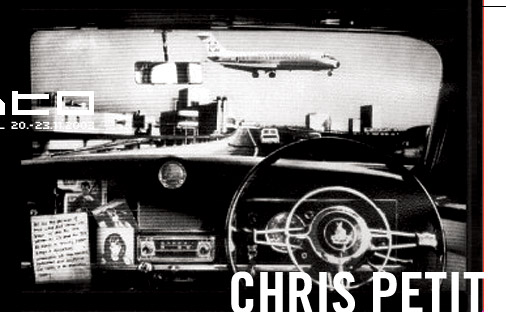


Radio On, the debut film by Englishman Chris Petit, is one of the most emotionally haunting movies in the short history of Avanto. Radio DJ Robert B receives a birthday package containing three Kraftwerk cassettes from his brother in Bristol whom he hasn't seen in ages. After a while Robert gets a phone call from his mother, and learns his brother is dead. Robert decides to drive from London to Bristol and try to clear up the mysterious circumstances of his brother's death. There really is not much more to the plot of Radio On. Still, its 101 minutes are full of intense atmosphere, mainly on the road, with a prevalent mood of bleak alienation. The black-and-white, beautifully shot film is the epitome of a road movie as a psychological portrayal of the protagonist's mindscape - in this case apathy. Radio On is a cult movie for those into British culture of the 70's and 80's: rain, grey wastelands, tower blocks, endless driving on the A420, and monumental overpasses… Violence erupting all over Britain and the widespread despair in society at large loom over the whole film as news heard on the car radio. The influence of co-producer Wim Wenders is felt in the long shots of romantic driving sequences, as well as in the use of music. Indeed, the soundtrack paints a valid picture of the times with songs by Kraftwerk, David Bowie, Robert Fripp, Lene Lovich, Devo, and Wreckless Eric. In his collection of essays Lights Out for the Territory Ian Sinclair places Radio On in the company of a few other British anomalies - Blow-Up (Michelangelo Antonioni, 1966), Witchfinder General ((Michael Reeves, 1968), Performance (Donald Cammell & Nicholas Roeg, 1970), and London (Patrick Keiller, 1994) - which all seem to substantiate Francois Truffaut's maxim that it is simply impossible to make good films in Great Britain – all the while disproving it completely. The visionary nature of these films is undeniable. They are not England's answers to the Tarkovskys, the Herzogs, the Fellinis, or anything else for that matter: they are autonomous works of art in themselves, challenging the canonized criteria for what is, in cinematic terms, "good" or "important". No wonder, then, that the rarely shown Radio On is often mistaken for an exercise in tediousness or pretension. "The areas that interest me are where the commercial and the avant-garde overlap. In commercial terms I've probably been too wayward and not canny enough at dealing with that system. And on the other hand, I've never belonged to the enfranchised avant-garde", Petit himself commented. The remix Radio On (UK, West Germany, 1980). 101 minutes. Production: British Film Institute, National Film Finance. Producers: Keith Griffiths, Renee Gundelach, Peter Sainsbury, Wim Wenders. Camera: Martin Schafer. Directed by Chris Petit. Music: David Bowie, Eddie Cochran, Kraftwerk, Lene Lovich, Robert Fripp, Wreckless Eric. Actors: David Beames (Robert), Lisa Kreuzer (Ingrid), Sandy Ratcliff (Kathy), Andrew Byatt, Sue Jones-Davies, Sting, Sabina Michael, Katja Kersten. Radio On (remix) (UK, 1998). 24 minutes. Production: Illuminations Films. Producer: Keith Griffiths. Directed by Chris Petit. Sound design: Bruce Gilbert. |
Radio On by Chris Petit is screened at the Orion theatre on Thursday, November 20th at 21.00 and rerun on Saturday the 22nd at 17.00. Radio On (remix) is screened as a part of the Avantoscope 2 programme in Kiasma Theatre on Saturday, November 22nd at 13.30. Links: |